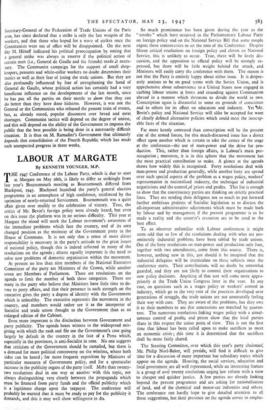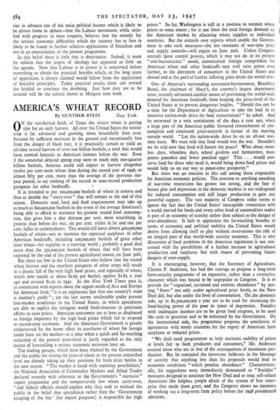LABOUR AT MARGATE
By KENNETH YOUNGER, M.P.
THE 1947 Conference of the Labour Party, which is due 'to start at Margate on May 26th, is likely to differ as strikingly from last year's Bournemouth meeting as Bournemouth differed from Blackpool, 1945. Blackpool launched the party's general election programme in an atmosphere of high confidence, reinforced by the optimism of newly-returned Servicemen. Bournemouth was a quiet affair given over mainly to the celebration of victory. True, the critics of Mr. Bevin's foreign policy were already heard, but even on this issue the platform was in no serious difficulty. This year at Margate the mood will mark the Labour movement's awareness of the immediate problems which face the country, and of its own changed position as the mainstay of the Government party in the House of Commons. It is not only that a sense of more direct responsibility is necessary in the party's attitude to the great issues of national policy, though this is indeed reflected in many of the resolutions on the agenda ; almost equally important is the need to solve new problems of domestic organisation within the movement.
At present no less than nine members of the National Executive Committee of the party are Ministers of the Crown, while another seven are Members of Parliament. There are resolutions on the agenda to limit the number of both these categories. There are many in the party who believe that Ministers have little time to de- vote to party affairs, and that their presence in such strength on the executive gives the party a degree of identity with the Government which is unhealthy. The executive represents the movement in the country, and members would rather see it as the interpreter of Socialist and trade union thought to the Government than as an enlarged edition of the Cabinet.
Even more important is the distinction between Government and party publicity. The agenda bears witness to the widespread mis- giving with which the rank and file see the Government's case going largely by default in the country in the face of a Press which, especially in the provinces, is anti-Socialist in tone. No one suggests that criticism of the Government should be curtailed, but there is a demand for more political controversy on the wireless, where both sides can be heard ; for more frequent exposition by Ministers of particular measures of Government policy, and for a spectacular increase in the publicity organs of the party itself. Mote than twenty- two resolutions deal in one way or another with this topic, not always distinguishing very clearly between the propaganda which must be financed from party funds and the official publicity which is a legitimate charge upon the taxpayer. The conference will probably be warned that it must he ready to pay for•the publicity it demands, and this it may well show willingness to do. So much prominence has been given during the year to the " revolts " which have occurred in the Parliamentary Labour Party on foreign policy and on the National Service Bill that some people expect these controversies to set the tone of the Conference. Despite fifteen critical resolutions on foreign policy and eleven on National Service, this is unlikely to occur. True, there will be lively dis- cussion, and the opposition to official policy will be strongly ex- pressed, but there will be little weight behind the attack, and Ministers will easily carry the conference with them. The reason is not that the Party is entirely happy about either issue. It is desper- ately anxious to be on good terms with the Soviet Union, and is apprehensive about subservience to a United States now enraged in curbing labour unions at home and crusading against Communism abroad in a manner which threatens to divide the world in two. Conscription again is distasteful to some on grounds of conscience and to others for its effect on education and industry. Yet Ur. Bevin's policy and National Service will alike be accepted for want of clearly defined alternative policies which could meet the inescap- able facts of the situation.
Far more keenly contested than conscription will be the present size of the armed forces, for this much-discussed issue has a direct effect upon another which is certain to take the centre of the stage at the conference—the use of man-power and the drive for pro- duction. This, rather than foreign affairs, is Labour's main pre- occupation ; moreover, it is in this sphere that the movement has the most practical contribution to make. A glance at the agenda shows how widely this is recognised. Forty resolutions deal with man-power and production generally, while another forty are spread over such special aspects of the problem as a wages policy, workers' representation in nationalised industry, the technique of industrial negotiations and the control.of prices and profits. This list is enough to show that the constituency parties are thinking on strictly practical lines. They are sending their delegates not so much to put forward further ambitious projects of Socialist legislation as to discuss the all-important administrative adjustments which must be made both by labour and by management if the present programme is to be made a reality and the country's resources are to be used to the best effect.
To an observer unfamiliar with Labour conferences it might seem odd that so few of the resolutions dealing with what are pre- eminently industrial problems have been tabled by trade unions. Out of the forty resolutions on man-power and production only four, together with two amendments, come from this source. There is, however, nothing new in this, nor should it be imagined that the industrial delegates will be inarticulate on these subjects once the conference starts. Their contributions will no doubt be somewhat guarded, and they are not likely to commit their organisations to new policy decisions. Anything of that sort will come more appro- priately at the Trade Union Congress later in the year. In any case, on questions such as a wages policy or workers' control in industry, which go to the very root of the practices developed over generations of struggle, the trade unions are not unnaturally feeling their way with care. They are aware of the problems, but they owe it to their members to see that concessions are matched by guaran- tees. The numerous resolutions linking wages policy with a simul- taneous control of profits and prices show that the local parties share in this respect the union point of view. This is not the first time that labour has' been called upon to make sacrifices to meet an economic crisis ; this time it is determined that the sacrifices shall be more fairly shared.
The Steering Committee, over which this year's party chairman-, Mr. Philip Noel-Baker, will preside, will find it difficult to give time for a discussion of many important but subsidiary topics which appear on the agenda. Housing, the social services, education and local government are all well represented, while an interesting feature is a group of over twenty resolutions urging law reform with a view to cheaper and quicker justice. A few parties are already looking beyond the present programme and are asking for nationalisation of land, and of the chemical and motor-car industries and others. The conference can hardly hope to give detailed attention to all these suggestions, but their presence on the agenda serves to empha-
size in advance one of the main political lessons which is likely to be driven home in debate—that the Labour movement, while satis- fied with progress in most respects, believes that the remedy for the serious economic difficulties which the country has to face is likely to be found in further selective applications of Socialism and not in an emasculation of the present programme.
In this belief there is little that is doctrinaire. Indeed, it must be seldom that the jargon of ideology has appeared so little on the agenda. Now that Labour is in power it is concerned before everything to obtain the practical benefits which, in the long years of opposition, it always claimed would follow from the application of Socialist principles. Today practical results alone can reward the faithful or convince the doubting. Just how they are to be assured will be the central theme at Margate next week.



































 Previous page
Previous page